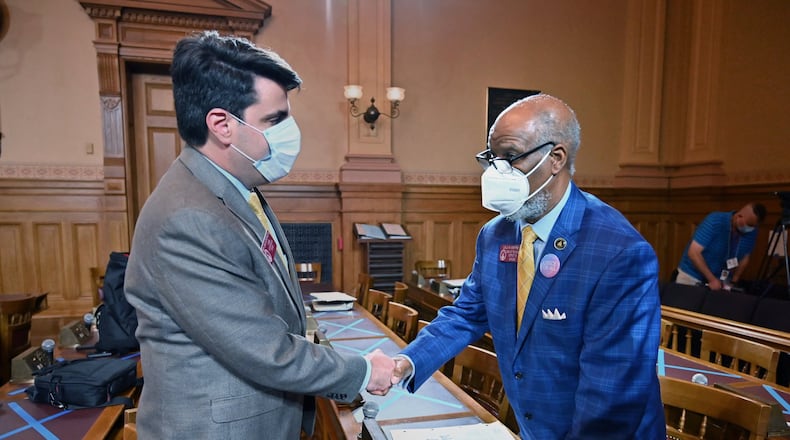Civil rights advocates hoped the passage of hate crimes legislation last week would be a step toward a more equitable criminal justice system. Georgia House lawmakers are planning a series of hearings that could pave the way for those changes.
State Rep. Chuck Efstration, R-Dacula, said Monday that he'll hold hearings starting in early July on the repeal of the citizen's arrest law, a statute dating to the Civil War that was initially cited by a prosecutor to justify the killing of Ahmaud Arbery.
Efstration, who chairs the House Judiciary Non-Civil Committee and sponsored the hate-crimes law, said additional hearings to review other “needed reforms” are also planned.
“There is bipartisan acknowledgement of the problems with Georgia’s citizen’s arrest statute,” said Efstration. “We must act decisively. No parent should live in fear for the safety of her child every time he leaves home. We have been called to do much more, and the time to act is now.”
Georgia has had statutes on the books since 1863 that allow residents to take law enforcement into their own hands if they have witnessed a crime and the police aren’t around. Critics say the laws are easily abused and no longer necessary with widespread law enforcement protection and 911 service.
Their calls have grown louder amid nationwide protests demanding equality and justice spurred by the deaths of Arbery and other Black victims.
Georgia Democrats, the state NAACP and other groups pressed for the repeal of citizen's arrest laws, as well as a rollback of stand-your-ground rules, shortly after graphic video of Arbery's death emerged.
It almost gained traction. In the closing days of the pandemic-delayed legislative session, Republican leaders quietly worked with Democrats to hash out a compromise that would have scaled back or repealed the citizen’s arrest statute.
But any chance of an agreement fell through shortly before the session concluded Friday.
“Some members favor a total repeal, others favor a carveout for protecting your home and property,” said House Speaker David Ralston. “It would have been a long discussion to have in an environment where we were so focused on the budget and hate crimes bill.”
Ralston said he expects legislation limiting citizen’s arrest powers “to be on the agenda when we come back in January.”
Gov. Brian Kemp wouldn’t comment specifically about the citizen’s arrest proposal – “I don’t want to lay my cards on the table just yet,” he said – but he was supportive of a more proactive approach to stopping racist crimes before they happened.
“That is an issue that really affects the aftermath of something that has already happened,” he said of the hate-crimes law. “What I want to do is to be forward thinking on how we prevent things from happening in the firs place. That’s where my focus will be.”
Efstration, too, said imposing additional penalties on hate crimes is “only the beginning of our work” after Arbery's death.
“We must redouble our efforts to identify and address injustices, wherever we find them, in the criminal justice system.”
About the Author
The Latest
Featured




